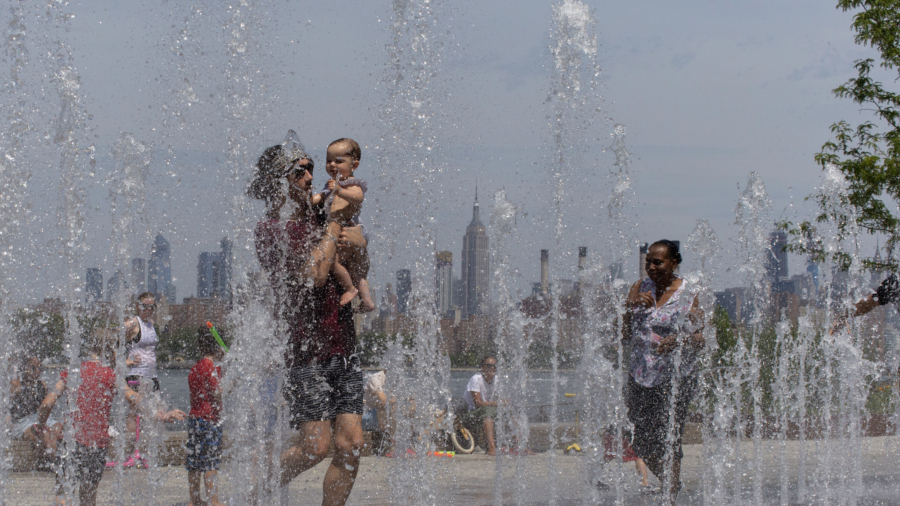NEW YORK—A heat wave will continue to keep much of the Eastern United States in its grip on Sunday, July 21, while a cold front that could lower temperatures in the middle of the country may be accompanied by thunderstorms that threaten flash floods.
The National Weather Service says the “oppressive and dangerous” heat wave will abate by Monday and Tuesday. The agency says a swath of the East Coast, from the Carolinas up to Maine, faces the greatest heat threat Sunday. Daytime highs are expected in the mid-to-upper 90s, which, coupled with high humidity, will feel like 100 to 110 degrees Fahrenheit.
A cold front has brought welcome relief today to the Upper Midwest and Great Lakes. However, excessive heat continues from portions of the Plains/MS Valley to the East Coast. As the cold front slowly moves south and east, watch for strong to severe storms with heavy rain. pic.twitter.com/m8ZNj8uh6p
— National Weather Service (@NWS) July 21, 2019
It’s not expected to get much better when the sun goes down, as temperatures are expected to remain at or above the high 70s overnight.
Inland, strong wind and rain were expected to persist Sunday in the Midwest, and a cold front stretching between the Central Plains and the Great Lakes region is forecast to move south. But in addition to cooler temperatures, the cold front is expected to carry showers and thunderstorms, which could lead to heavy rainfall and flash flooding in the Midwest.
Many in areas facing excessive heat this weekend have no air conditioning, and cities have opened cooling shelters. With record- or near-record-high temperatures at night, when many air-conditioned places are closed, the weather can become especially dangerous for people who don’t get a chance to cool down, experts say. The risks are greater for young children, the elderly and the sick.

In Norwich, Connecticut, Larry Konecny watched as one of his workers in a boom lift cleaned the outside of an office building, a couple of stories up. The pair had no choice but to work in 90-degree heat and stifling humidity because the job needed to be done when office workers were away, Konecny said.
“He’s pressure-washing, so the water is splashing,” he said. “So at least there’s some degree of refreshment.”
The heat wave has canceled events across the affected region, including in New York City, where authorities scrubbed a Times Square commemoration of the 1969 moon landing.
Operators of the Monmouth Park horse racing track in New Jersey canceled some races and pushed back others Saturday, including the $1 million Haskell Invitational that went off after 8 p.m. Maximum Security, the horse that crossed the finish line first in this year’s Kentucky Derby and then was disqualified, was declared the victor after a short steward’s inquiry.
Amid pressure over a series of horse deaths in California, several other tracks canceled their Saturday races, including Saratoga Race Course and Finger Lakes in New York and Laurel Park in Maryland.
In Chicago, heat nixed several outdoor events, including a 5K run in Grant Park and a morning workout at Millennium Park. Over three days in July 1995, more than 700 people died during a heat wave in Chicago as temperatures rose above 97 degrees. Many of the dead were poor, elderly and lived alone.
It had hit 94 degrees by first pitch at the San Diego Padres-Chicago Cubs game at Wrigley Field, but some fans didn’t want to stay away, largely watching from shaded concourses as the Cubs won 6-5.
“We’re sticking to water and not having beer. It’s helping a little bit,” said Jaclyn Jendrisak of St. Louis.
Other big-league ballparks broiled, with players avoiding on-field batting practice as fans were encouraged to keep drinking from supplemental hydration stations at Yankee Stadium. Meanwhile, the PA system at Great American Ball Park in Cincinnati cried for the weather to “Let It Snow,” blaring it along with other winter-themed pregame songs.

Storms have knocked out power to hundreds of thousands of people in parts of Michigan and Wisconsin, heightening the misery.
In Philadelphia, several hundred people were evacuated from a retirement community due to a partial power outage, though it wasn’t immediately clear whether the problem was heat-related. Residents were taken to a nearby shelter, and police said some went to a hospital for evaluation.
To reduce strain on the electrical grid, New York City also directed office buildings to set thermostats no lower than 78 degrees through Sunday.


